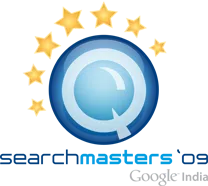 Google India recently organized a Search Masters Conference for webmasters (and bloggers) at the Google Bangalore Office on February 28th. The full-day event included presentations and interactive sessions and was a good learning experience.
Google India recently organized a Search Masters Conference for webmasters (and bloggers) at the Google Bangalore Office on February 28th. The full-day event included presentations and interactive sessions and was a good learning experience.
The audience were a mix of webmasters, bloggers, entrepreneurs, online marketers, SEO experts, web developers, etc. and the offline interactions with such a varied group were therefore almost as interesting and useful as the interactive presentations by Adam Lasnik, Rajat Mukherjee, and other members of the Google search team.
Vivaik Bharadwaaj hinted that Google might organize similar events in other Indian cities while Alok Goel also had some good news - the PowerPoint slides and video recording of the entire event would soon be published on the Google India blog for people who couldn’t make it to the main event.
And finally, here’s a quick round-up of the key points, tips and best practices that were discussed during the various sessions at the Search Conference.
1. The main reason why content is often blocked or de-indexed by search engines is because someone may have uploaded an old robots.txt in the root directory.
2. The site: operator in Google is designed for performance and not comprehensiveness. If you like to know more about how your pages are indexed in Google, always use the Webmaster console as it will paint an exact picture of how Google views your website.
3. The AddURL service of Google should only be used for submitting new domains that Google bots are unaware of. You should not use the tool to suggest individual web pages as your request will be ignored.
4. If you are buying a domain name, always check the backlinks from Webmaster tools and file a reconsideration request if there are links pointing to bad neighborhoods.
5. XML Sitemaps should include a list of all web pages on your website that you want search engines to know about. This file will help crawlers discover your pages but will not alleviate organic ranks.
6. If your website contains user reviews copied from sites like Amazon, Google is more likely to ignore that content. Also read Matt’s comment on empty reviews.
7. Good links are like votes. They are given consciously.
8. You may use CSS or HTML Tables to display content on your website - they are treated no differently from from the perspective of search.
9. Some search experts feel that keyword density (the number of times a keyword or phrase appears compared to the total number of words in a page) is a factor in organic ranks but that may not be true according to Adam Lasnik.
10. Never ever repeat keywords in the title of your web page. The same word appearing twice in a title may be OK but anything beyond that could be seen as spam.
11. Try to write page titles that are brief yet compelling. There’s no prescribed word limit but you should use common sense and the title should not be ‘obnoxiously long’.
12. If you embed videos, images or audio files in your blog, always add ‘thoughtful context’ to the multimedia - this is especially true if you have photo galleries on your blog and like them to show up in search engines. Talk about the embedded video in text so that bots can read it.
13. Always submit spam reports from your Google Webmasters account - the reports are taken more seriously then.
14. To prevent bots from completely indexing a certain section of your website, you should protect that area with a username and password. Other techniques like robots.txt and NOINDEX meta tags may not always work if there are alternate routes to your content.
15. If bad sites are pointing to your content, that won’t possibly effect your rankings in Google but the reverse should not be true.
16. Microformats are currently ignored by Google.
17. If you have a form on your website (like Contact Me) that doesn’t work without JavaScript, you are a potentially missing out lot of visitors who may have tried to reach you via the form.
18. All websites must have an HTML sitemap as well as an XML Sitemap. HTML sitemaps suggest how may clicks are required to reach a particular page while XML maps are also used by Google Custom Search for site search. Please not that web directories are treated differently in Google.
19. Try to describe a photo in ALT tags and the image name. For instance, if you have a picture of Panda playing with water, a good image name is panda-in-water.jpg instead of panda.jpg or photo-of-panda.jpg.
20. Be kind to your users and always optimize the size of images before uploading them on to your website. Not everyone has the bandwidth to download a 2 MB photograph that you may directly transferred from the camera to a web page.
21. A website with a .com address may be ambiguous for geo targeting. The location of your web hosting company is also a factor in geo targeting.
22. If you have a large website and some of your good content doesn’t appear or rank well in organic search, put links to those pages on your home page so that Google knows about your best content.
23. HTML validation is great as it makes your site more accessible but this will have “zero” effect on search. Google will not distinguish between valid or invalid web pages while assigning ranks.
24. Sites that are hosted on slow web servers may reduce the crawling rate in Google Webmaster Central so that frequently-visiting Google bots don’t affect their site performance.
25. Google will not penalize your content if it is found to be a duplicate copy of another web page and that’s because even good websites syndicate content on the Internet. Make sure the copy links to your original article so that search engines can credit the right owner. Adam suggests having a link in the RSS footer.
26. If you come across a website that may be stealing your content and still ranking high in Google, you may either fax a DMCA complaint to Google or post a new thread in Webmaster forums and one of the official Google Guides may look into your case.
27. Don’t worry too much about linking to websites that may not be relevant to your niche. For instance, you could be writing a tech blog but you can safely include a friend’s blog in your blogroll even if it’s about food or entertainment. Adam says that Google looks at “overall patterns” to determine if people are buying or exchanging links.
28. Always test your website in a web browser with JavaScript turned off. That’s how bots will navigate your site.
29. If you are rewriting URLs or shifting to a different CMS (like Drupal to WordPress), don’t move all your content at once. Try moving one section and see how it goes - Use a 301 redirect on a page to page basis.
30. Google looks at the history overall pattern of links going out of your site. So if one of the outbound links on your website points to bad neighborhood (because the domain expired and the new owner converted it into a porn or gambling site), you should not worry about it.
31. Have high quality web pages and please do not focus on quantity.
Other than Webmaster tools & search, there were interesting sessions on Google Custom Search, Building mobile websites and Google Analytics with Website Optimizer but I’ll probably cover them later.
You may also want to read about the Site Clinic where sites were examined live for feedback and improvements.


